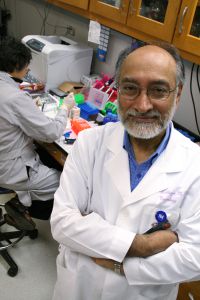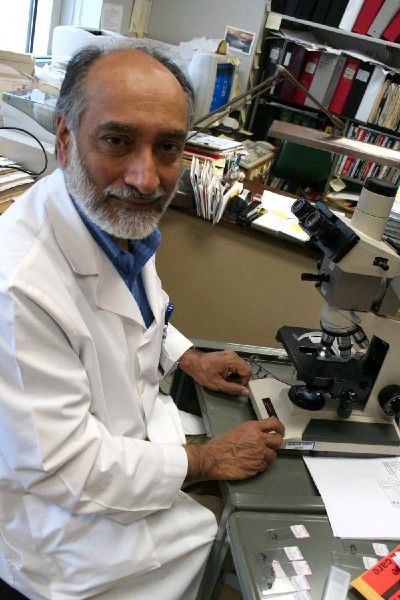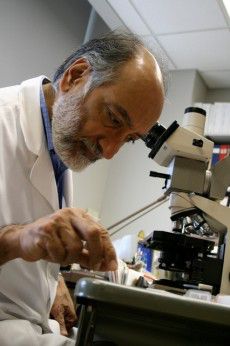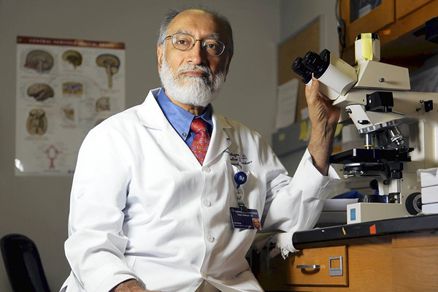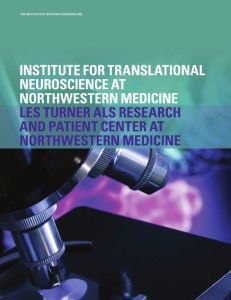THE WETZEL FOUNDATION RESEARCH AND EDUCATION FUND – Established January 2015
Northwestern University Feinberg School of Medicine is known the world over for leading groundbreaking ALS (amyotrophic lateral sclerosis) research and for providing exceptional care and support to patients and families living with this debilitating and complex disease. ALS, also known as Lou Gehrig’s disease, is a progressive and fatal neurodegenerative disease that often strikes people in the prime of their lives. Anyone can be diagnosed with ALS: a mother, a son, a sister, or a grandfather. ALS affects an estimated 350,000 people worldwide, with an average survival of three years. The degeneration of nerves leads to muscle weakness and impaired speaking, swallowing, and breathing, eventually causing paralysis and death. The effects are devastating, and currently there is no cure.
With respected and high-impact programs in ALS, Northwestern Medicine is setting the pace in the field of ALS and is offering new hope for the future of ALS care, research, training, and outreach. Recently, we proudly announced the creation of the Les Turner ALS Research and Patient Center at Northwestern Medicine. This breakthrough Center was launched with the support of the Les Turner ALS Foundation—a steadfast partner with Northwestern for 35 years. Northwestern and the Les Turner ALS Foundation are now leading a major effort to raise $10 million in funds to fully endow this new Center in perpetuity
The Les Turner ALS Research and Patient Center will accelerate research and advance patient care in ALS. The Center will bring together the world-renowned Les Turner ALS Foundation Research Laboratories, the Les Turner/Lois Insolia ALS Center, the ALS Tissue Bank, and other ALS research, clinical, and education activities at Northwestern under one comprehensive umbrella. The Les Turner ALS Research and Patient Center is part of the Ken and Ruth Davee Department of Neurology and will operate under the Institute for Translational Neuroscience at Northwestern Medicine.
To learn more about the Les Turner ALS Research and Patient Center at Northwestern Medicine please visit http://www.feinberg.northwestern.edu/sites/alsresearch
Northwestern has a foundation of excellence in ALS research and has contributed significant advances from the laboratories of Teepu Siddique, MD, the Les Turner ALS Foundation/Herbert C. Wenske Foundation Professor, and P. Hande Ozdinler, PhD, assistant professor of neurology. Dr. Siddique’s visionary leadership of the Division of Neuromuscular Disorders has helped to build a strong platform and tremendous momentum for the research activities and programs of the new Les Turner ALS Research and Patient Center. As a lead principal investigator, his laboratory has made several important discoveries in the field of ALS over the years, including the identification of genetic causes of ALS. Dr. Siddique’s discoveries provide potential targets for drug therapy and show that all types of ALS are tributaries, pouring into a common river of cellular incompetence. Northwestern University Feinberg School of Medicine is the locus of much of the ALS research in the United States.
- Les Turner ALS Foundation/Herbert C. Wenske Foundation Professor
- Davee Department of Neurology and Clinical Neurological Sciences
- Department of Cell and Molecular Biology
- Director, Division of Neuromuscular Medicine
The Les Turner ALS Research Laboratory led by Teepu Siddique, MD, focuses on understanding the processes by which ALS develops so that effective treatments can be developed. The lab was first dedicated in 1979 and has been directed by Dr. Siddique since 1991.
Dr. Siddique, the Les Turner ALS Foundation/Herbert C. Wenske Foundation Professor, is a physician-investigator with expertise in the neurology, molecular genetics, biochemistry and cell biology of neurodegenerative disease. He is the director of the Division of Neuromuscular Medicine at Northwestern, where he leads the Les Turner ALS Research Laboratory, and is co-director of the Les Turner/Lois Insolia ALS Center. His research in neurogenetics has been generously funded by the NIH since 1985.
Dr. Siddique and his colleagues in the laboratory and center carry out a wide range of molecular genetic experiments to understand the causes of ALS, identify biomarkers to diagnose and track ALS progression, and conduct drug trials to treat ALS. Dr Siddique initiated the molecular genetic approach to ALS in 1984 which lead to the successful identification of many genetic causes for ALS including SOD1, ALSIN, PON, FUS, TDP-43, SQSTM1 and UBQLN2. Recently he and his colleagues identified a common pathology for all of ALS involving ubiquilin2 and SQSTM1. His group has engineered several models for ALS including the first genetic model for neurodegeneration. His current research includes discovery of novel causes for ALS, the gene-environmental interaction in ALS and a common mechanism of disease amenable to therapeutic intervention. A mechanism involving the ubiquitin-proteasome pathway and autophagosome machinery, involved in recycling of cellular contents, was discovered by his team in 2011 and found to be modulated by ubiquilin2/SQSTM1 class of proteins. This molecular pathway appears to underlie all types of ALS irrespective of cause, and provides an attractive target for treatment. Dr. Siddique’s group has made an animal model for this pathway and is developing cell-based assays to screen drugs to treat ALS.
IMPACT THE WORLD
DR. SIDDIQUE’S MOST RECENT RESEARCH BREAKTHROUGH
Dr. Siddique was the senior researcher for the new gene linked to familial ALS involved in the processing of accumulated proteins, Ubiquillin-2. He has dedicated most of his career to neurological disorders such as ALS. Dr. Siddique will be speaking of the discovery of the Ubiquillin-2 and its impact on the future of ALS research.
https://alsa.webex.com/alsa/ldr.php?RCID=50c171f2719a0110bc12a1f2138b0ec1




